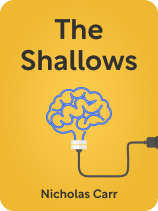

This article is an excerpt from the Shortform book guide to "The Shallows" by Nicholas Carr. Shortform has the world's best summaries and analyses of books you should be reading.
Like this article? Sign up for a free trial here.
Is the internet reshaping our ability to concentrate and retain information? How might our digital habits be affecting our capacity for deep thinking?
The rise of internet use has brought about significant changes in how we process and consume information. Nicholas Carr’s book The Shallows explores the potential drawbacks of our increasingly digital lives, focusing on three main areas: concentration, deep reading, and information retention.
Read on to learn about three disadvantages of internet use and discover how our online habits might be impacting our cognitive abilities.
Disadvantages of Internet Use
Carr contends that the internet is undermining our capacity for contemplative concentration. Frequent internet use does this by prompting us to skim what we read rather than to explore it more deeply. As a result, our digital lives lean more toward gathering superficial knowledge and not retaining much of it at all. In his book, Carr details three disadvantages of internet use related to this form of information consumption.
Disadvantage #1: Loss of Concentration
Carr states that the internet, while a powerful knowledge tool, is gradually eroding our capacity for sustained concentration and deep thought. Extensive internet use changes how we absorb information—instead of spending the time to understand comprehensive narratives and well-reasoned arguments, internet users pick and choose among millions of fragmented bits of data. The very design of online information encourages reading in short bursts rather than engaging with lengthy passages. Consequently, constant use of online resources may lead you to struggle with focusing on more extended texts such as books and in-depth articles on a topic.
Carr also writes that the rise of electronic texts and e-books adds another layer to how we consume written content due to the hyperlinks and interactive elements that are often embedded in these formats—features that introduce the internet’s infinite distractions into a long-form document. Digital text allows for easy navigation through a document without requiring a reader to absorb its entirety, which encourages readers to cherry-pick what interests them without giving attention to the document’s context or overall arguments—essentially reducing textual works into bite-sized chunks for easy consumption.
The internet is even rewiring how our brains process information. The design of websites and other online tools encourages repeated behaviors, such as clicking links, which are coupled with audiovisual cues such as pictures, music, and videos. In essence, Carr suggests that the internet conditions us to crave quick gratification through rapid stimulus-and-reward cycles. Social media platforms further exploit this reward cycle by leveraging our innate desire for social approval—for instance, by counting how many “likes” we get when we repost attention-grabbing headlines. Internet use brings some benefits, such as enhanced hand-eye coordination, but the cost seems significant—a diminished ability for focused thought that stifles human creativity.
Disadvantage #2: Loss of Deep Reading
Carr argues that, in addition to undermining our concentration, the internet’s instant rewards have hampered the practice of deep reading that printed books encourage. There’s an ongoing battle between deep and shallow reading—immersive engagement versus skimming—with evidence suggesting that our digital lives promote the latter. The evolution of the written word has introduced us to deep concentration and enhanced our abstract thinking skills, but the shift toward skimming information online is reshaping not just our reading habits but also our media consumption as a whole.
While this may sound like a dire warning, Carr points out that new information media don’t completely supplant whatever came before. When the written word was invented, it didn’t replace oral culture—instead, it added another layer to our communication methods. Silent reading wasn’t common, Carr says, until written languages developed features like word breaks and punctuation to make reading easier. Once this happened, reading reshaped our brains to focus deeply on a single task, in contrast to our inherent nature of being easily distracted. Because of this, reading books not only improved our concentration but also enhanced our abstract thinking skills.
However, Carr makes a distinction between “deep” and “shallow” reading. While deep reading involves immersive engagement, shallow reading is used in tasks like skimming an index or reading street signs. Evidence suggests that internet use promotes skimming text over deep reading, even when we interact with printed text offline. While browsing online content, our eyes hunt around for relevant bits of information instead of following every line of text. Research shows that this “skimming” eye movement pattern is becoming dominant among readers largely because of extensive internet usage, whereas in pre-internet times it was only a peripheral skill used on occasion depending on need.
Carr describes how the shift from concentrated reading to skimming has altered the media landscape as a whole. While internet use has actually increased the amount of time we spend reading every day, that reading is now largely in the “shallow” category. Traditional publishers now tailor their content to presentation styles similar to what people experience online, either by inserting hyperlinks into e-books or by trimming lengthy news articles down to more rapidly consumable chunks. What the internet hasn’t impacted is TV time, which means that it’s increased our daily screen time at the cost of printed books, magazines, and newspapers.
Disadvantage #3: Loss of Retention
Skimming text by default comes with a price. Using the internet as our primary source of information doesn’t just reduce our level of engagement, it also reduces how much of it we can retain. Carr explains that the pace at which you consume information has a direct impact on how much you remember. When you read slowly, such as with a physical book, your brain has ample time to transfer information into your long-term memory. However, the internet overloads that mental process. Given the rapid pace at which the internet drives you to skim online content, your brain struggles to transfer all that data from short-term memory into long-term storage.
The cognitive overload you feel online also hampers your ability to discern what information is worth remembering. Carr says that this issue is compounded by the constant distractions and decision-making demands that internet use entails. For instance, deciding whether to click on links embedded in text increases how much work your brain has to do. This added mental burden leads to overall loss of retention, and research backs this up. Readers who encounter hyperlinked texts, such as those included in this article, have a harder time remembering content compared to those who read the exact same text without the links. Whether you click on a link is immaterial—what matters is the choice the link forces on you.
Beyond the internet’s onslaught of hyperlinks, we’re constantly bombarded by multimedia stimuli while online—advertisements, videos, pop-ups, and the like. Carr argues that instead of enhancing your retention (as many educators at one time thought they would), these audiovisual add-ons often interrupt your train of thought, significantly reducing your ability to focus on and comprehend what you’re reading. While it’s true that some multimedia content can boost learning when properly applied, such as relevant diagrams or video demonstrations, most often they do more harm than good. After all, on the internet, Carr says, multimedia’s primary design purpose is distraction rather than enhanced learning.

———End of Preview———
Like what you just read? Read the rest of the world's best book summary and analysis of Nicholas Carr's "The Shallows" at Shortform.
Here's what you'll find in our full The Shallows summary:
- The ways internet use is literally reconfiguring our brains
- How information technologies reshape human behavior
- The sweeping societal consequences of these changes in human cognition






